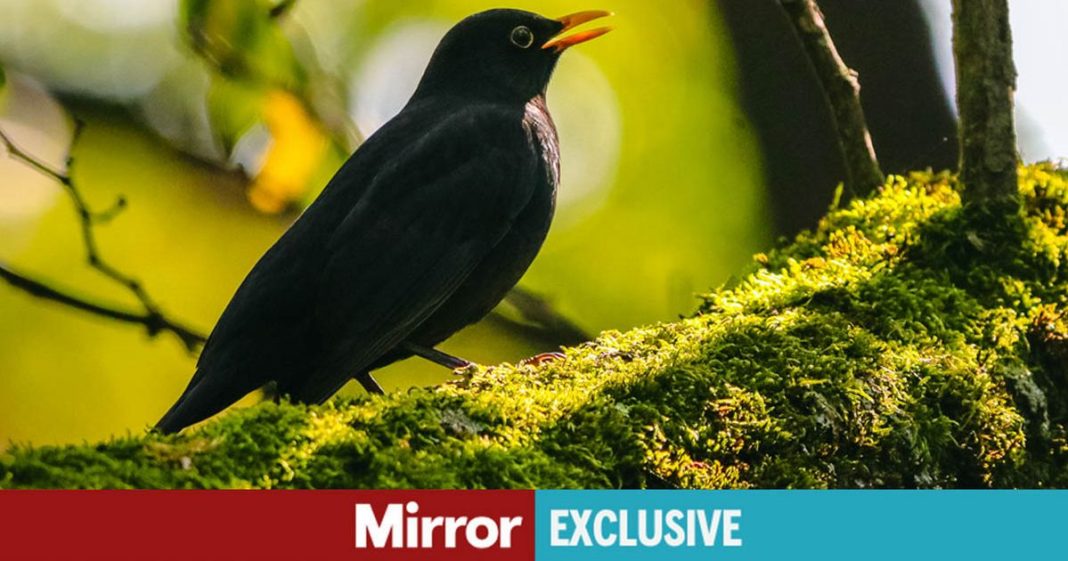Blackbirds may sometimes sing in the dead of night but to be truly enchanted by their silvery voices then listen out as the sun rises. Of all the songbirds exulting International Dawn Chorus Day on May 4, those baritone solos delivered by blackbirds from lofty perches backlit by the first morning rays will ring supreme.
Individual males can have repertoires of more than 30 verses, each three or four seconds long and filled with melodious notes to declare his territory and sound reveille over suburbia.
Bach, Beethoven and the Beatles all adopted the blackbird as a musical muse and, today, many regard its refrains a dependable alarm clock for an uplifting way to start the day.
Each year, the song becomes a little more subdued as blackbird populations in town and country recede.
This year’s RSPB Big Garden Birdwatch noted a 46% drop in mid-winter sightings since the nationwide survey began in 1979, a statistic mirrored by the 19% decline in breeding numbers over the past seven decades.
Increasingly, I see gardens being concreted over for car parking spaces or turned into plasticised dead zones rather than tended lovingly for plants and wildlife. This must be having an impact on blackbird numbers.
Another existential threat beckons from a new quarter – the arrival of a mosquito-borne virus that can be fatal to blackbirds. Usutu virus originates from South Africa but was detected in London in 2020 when blackbird numbers in the capital were already in decline.
The British Trust for Ornithology recently identified a national blackbird divide, noting how those in the north are faring better than their London counterparts.
BTO scientists are asking nature lovers to help them explore the spread of Usutu virus by signing up for the Blackbirds in Gardens survey.
This will help researchers understand how blackbirds use garden types differently as well as highlighting disease transmission risks. The study will also provide data on how successfully young blackbirds are raised at different levels in rural and urban gardens. For more details see bto.org/blackbirds
Now that spring is finally here, these feathered friends are returning to our gardens in even larger numbers as breeding season approaches. Garden and wildlife experts are encouraging Brits to lend a hand by leaving out food for these birds. Blackbirds are partial to fruit, berries, seeds and oats. You can assist them by scattering uncooked oats (like porridge oats), dog food, flaked maize or fat balls on the ground or a flat bird table (as long as it’s cleaned regularly).
This is because blackbirds are too large to feed from upright feeders, reports the Express. Garden experts Home and Roost.co.uk suggest that you can leave out mealworms for blackbirds, but if you don’t have that specialist food on hand, you can use items from your kitchen instead – including uncooked porridge, dried fruit and even dog food.
Home and Roost says: “Meaty dog food. This is a great one for anyone too squeamish to deal with mealworms. While blackbirds prefer to feed their young a natural diet, mainly worms and insects, they will supplement dog food if you offer it.”
While most of us probably don’t have a good supply of mealworms at home, pet owners will have dog food readily on hand and if not, a cheap tin of dog food next time you’re shopping can be saved for your garden, and will be cheaper than buying specialist bird foods. But blackbirds need the food to be put out on a flat feeder or on the ground as they are too big to feed from hanging feeders.
At Reach and across our entities we and our partners use information collected through cookies and other identifiers from your device to improve experience on our site, analyse how it is used and to show personalised advertising. You can opt out of the sale or sharing of your data, at any time clicking the “Do Not Sell or Share my Data” button at the bottom of the webpage. Please note that your preferences are browser specific. Use of our website and any of our services represents your acceptance of the use of cookies and consent to the practices described in our Privacy Notice and Cookie Notice.

